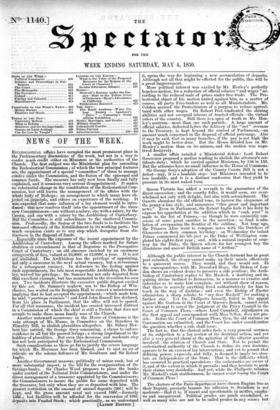NEWS OF THE WEEK.
ECCLESIASTICAL affairs have occupied the most prominent place in the Parliamentary discussions of the week, but not in a way to confer much credit either on Ministers or the authorities of the Church. The first subject was the Ministerial plan for amending the Ecclesiastical Commission ; of which the two principal features are, the appointment of a special "committee" of three to manage estates under the Commission, and the fusion of the episcopal and common funds. The measure has only now been finally and fully explained, and it occasions very.serious disappointment. It makes no substantial change in the constitution of the Ecclesiastical Com- mission, but still leaves the management of its affairs with the -Whole bOdy of Bishops ; an arrangement to which many have eb- jected. on principle, and others on experience of the working. It was:eipected that some infusion of a lay element would be intro- aimed: this now resolves itself into the appointment of the three new Commissioners—one without a salary, one with a salary, by the Vrown, and one with a salary by the Archbishop of Canterbury. But the Committee is still subordinate to the unaltered Commis- sion. Professedly, the fusion of the two funds is to facilitate the increased efficiency of the Establishment in its working parts ; but much suspicion exists as to any step which derogates from dis- tinctness in the disposal of funds.
Especially sinde the exposure of the recent appointment by the
Archbishop of Canterbury. Among the offices marked for future abolition or retrenchment is that of Registrar to the Prerogative Court of Canterbury`; an old sinecure enriched by an enormous overgrowth of fees, valued at 10,000/. or 12,000/. a year. It is not, yet abolished. The Archbishop has the privilege of appointing, net_ only a successorto_ the next actual vacancy, but a reversioner for a subsequent vacancy. In deference to the feeling against itiot .aPpeintanenti,-the late most respectable Archbishop, Dr. How- ley,"warVed his privilege : Dr. Sumner has not only departed from that excellent example, but has nominated to the reversion his own son. Two incidents illustrate the excessive public disgust excited by this act. Dr. Sumner's nephew, son to the Bishop of Win- chester, has waited on Sir Benjamin Hall to correct a misstatement implying that he had accepted the appointment,—which made him, he said, "particeps crimints"! and Lord John Russell has declared, from his _place in Parliament, that the office will not be spared. For all that assurance, the incident has created increased distrust in a Commission of which the chief is still a Prelate that does not scruple to make these mean family uses of the Church.
Another untoward occurrence in the House of Commons is the
vain attempt of Mr. Hume in Committee on the Benefices in Plurality Bill, to abolish pluralities altogether. Mr. Sidney Her- bert has carried, Sir George Grey concurring, a clause to enforce residence in all but the poorest livings a strong impediment to the holding of pluralities. •But even this decorous and moderate step has not been anticipated by the Ecclesiastical Commission.
Such complications as these go far to justify the severe language for which Mr. Horsman has been blamed, and to east an air of ridicule on the solemn defences of Mr. Goulburn and Sir Robert Inglis. Another Government measure, politically of minor rank, but of more substantial import, is the bill for the reorganization of the Savings-banks. Sir Charles Wood proposes to place the banks under control of the National Debt Commissioners, and under the direct management of a treasurer appointed by the Commissioners ; the Commissioners to insure the public for sums deposited with the treasurer, but only when they are so deposited with him. The present restriction on the amount of annual deposits (301.) will be kept, and the gross amount must not exceed 100/.—formerly MO/. ; but facilities will be afforded for the conversion of 1001. deposits into Funded Stock ; which practically, as we understand
it, opens the way for beginning a new accumulation of deposits. Although not all that might be effected for the public, this will be a great improvement. More political interest was excited by Mr. Henley's perfectly hopeless motion for a reduction of official salaries "and wages "ac- cording to the ;educed scale of prices under free trade. The Pro- tectionist object of his motion united against him, as a matter of course, all party Free-traders as well as all Ministerialists. Mr.' Cobden accused the Protectionists of a purpose to reduce 'cul- tural with other wages. Sir Robert Peel vindicated the shining abilities and not overpaid labours of trusted officials—the virtual rulers of the country. Still there is a spice of truth in Mr. Hen- ley's nostrum—more than one such particle. A large amount of official salaries, deducted before the delivery of the " net " revenue to the Treasury, is kept beyond the control of Parliament —an amount much concerned in the disposal of official patronage. Also it may be said, that in many branches, if the pay is not high the work might be better done. But the House divided less on Mr. Henley's motion than on its animus, and the motion was nega- tived decisively. A smaller affair entailed a Ministerial defeat : Lord Robert Grosvenor proposed a motion tending to abolish the attorney's cer- tificate-duty; which he carried against Ministers, by 156 to 135. But the attornies have no small influence in the House of Commons.
Sir George Grey's adoption of the County Courts Bill is not a defeat—nay, it is a laudable step : but Ministers intended to be less laudable, and it is a distinct confession that they yield to pressure in its most naked form.
























